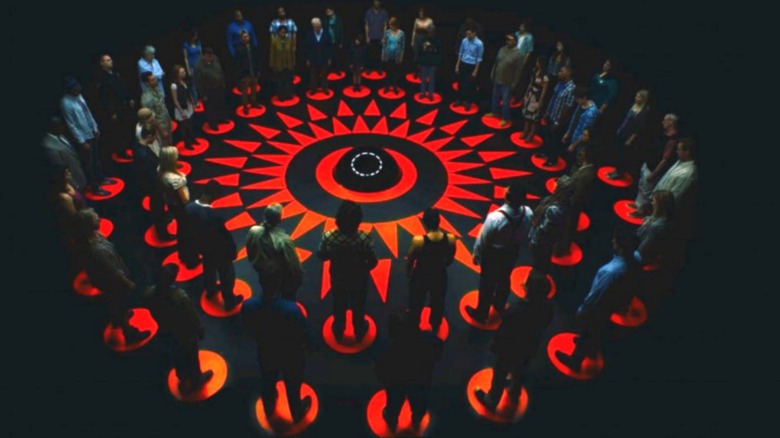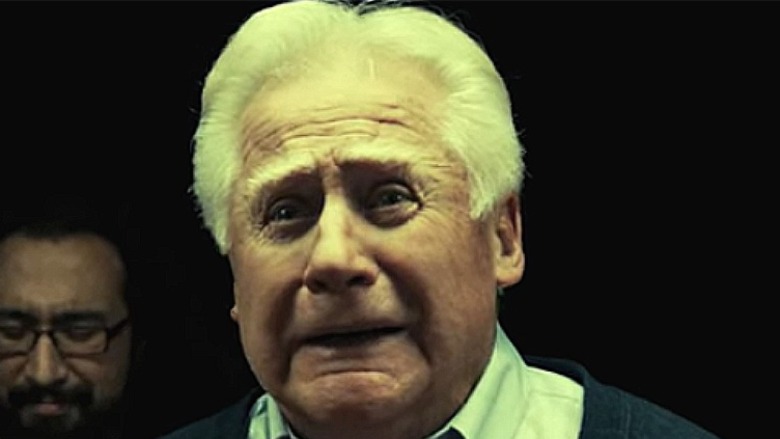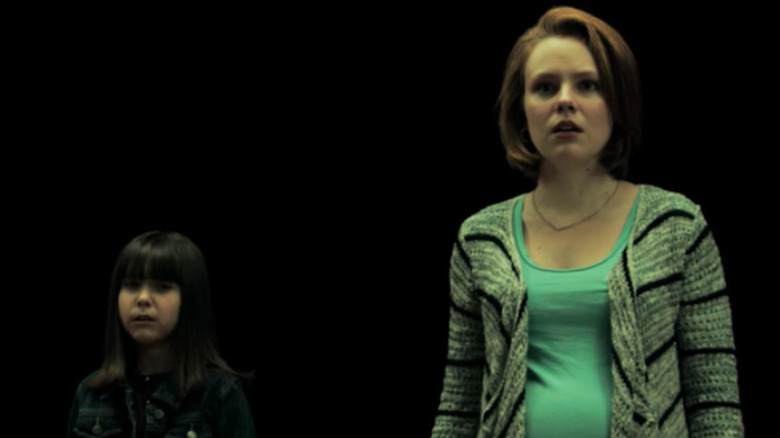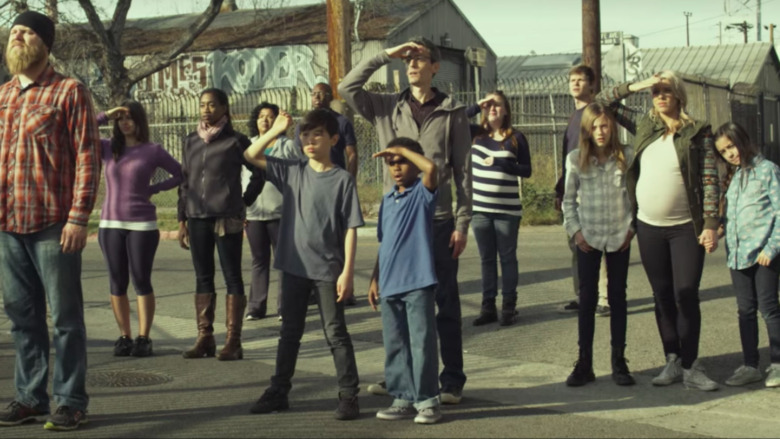The Ending Of Circle Explained
The 2015 horror-thriller movie "Circle" — which should not be confused with Emma Watson's 2017 techno-thriller "The Circle," or the American TV series also named "The Circle" – mostly flew under the radar when it premiered on Netflix. The narrative, which almost exclusively takes place in one location, (implied to be an alien spaceship) uses its premise to draw attention to the many prejudiced and biased ways that people are treated in society today and how we choose to value the lives of others.
The story begins with a diverse groups of 50 people of all backgrounds and ages standing on red dots in a circle. As they eventually wake, and people step out of their circles, they are killed by a machine at the center of the room. Through their panic and confusion, the crowd eventually begins to understand that in order to survive they need to decide who among them should be killed.
An older man pleads with the group not to kill him
After some trial and error, they realize that they can anonymously cast votes for who should die, and if they refuse, the machine kills someone at random every two minutes. If there's a tie in votes, the group must choose between those selected, and if no one is chosen then everyone in the tie is killed. Being complete strangers, the characters struggle in their decision. Their lack of information here amplifies the tendency of human beings to make snap judgments about others without bothering to know them.
The choices made expose the underlying prejudices people gravitate toward when their own lives are on the line. In a Reddit AMA, the writers Aaron Hann and Mario Miscione said that the reason they used mostly unknown actors was that they wanted the viewers to have no preconceived notions about those on-screen. In essence they aren't even characters, but archetypes representing certain parts of society.
With time running out, one person suggests they begin to pick the elderly in the group to buy themselves some time, justifying that they'll be dead soon anyway. They pick an older gentleman (Bill Lewis) who pleads not to be killed and asserts that he has as much of a right to live as anyone else, but his appeals fall on deaf ears.
A pregnant woman and a young girl become targets
Eventually people begin dropping like flies, some after expressing their racist views, or admitting to a violent past, others for lying, and some even volunteer to sacrifice themselves and buy time for the others. The central conflict arises when everyone realizes that only one person will walk out of the room and that there's a little girl (Ashley Key) and a pregnant woman (Allegra Masters) among them who probably have the best shot.
This reasoning makes sense: the code of "women and children first" has been around since the mid-1800's and is universally accepted by most as the righteous thing to do. So they split into two factions — those who want to protect the little girl and pregnant woman, and those who want to kill them and increase their own chances of survival.
Ultimately, Eric (Michael Nardelli) who appears to have been trying to save the child and pregnant woman throughout the ordeal, tricks the little girl into sacrificing her life while simultaneously voting to kill the pregnant woman and her unborn child. In this way he is the lone survivor, illustrating that the most conniving person willing to do anything at the expense of others is victorious. Much like society, it is those who only truly care about their own success and survival and have no interest in helping others who rise to the top.
We see a majority of children and pregnant women amongst the other survivors
Though Eric is technically the only one left alive, it's worth mentioning that one participant had refused to speak or vote for the entirety of events. In some ways, this individual is the true winner. Once part of the alien experiment in the circle, their fate was already pretty much sealed. Any action they took only gave their abductors exactly what they wanted. The man who refused to engage with the setup was the only one who truly fought back against his situation. By giving no response, he made their experiment completely useless. Though it may not have saved his life, it did allow him to face his death with more bravery and dignity than most.
Once Eric is freed we see numerous alien ships in the sky, implying that this ordeal was experienced by a large population. If so, these aliens were in a sense testing the values of humanity and how we determine whether some people are better or more deserving than others. The very act of judgment itself is directly connected with the idea of wickedness and virtue. When you vote for someone to die, you're suggesting that you're more worthy than them.
Thankfully, we see that survivors of other groups have children and pregnant women among their majority — leaving us a small glimmer of hope for the morality of the human race.



